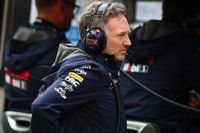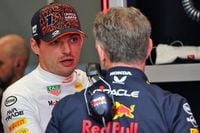In a stunning shakeup that has sent ripples through the Formula 1 paddock, Christian Horner was dismissed as Red Bull Racing's team principal and CEO on July 9, 2025, ending a remarkable two-decade tenure. This seismic change comes amid swirling rumors about Max Verstappen's future, with the reigning four-time world champion linked to a potential blockbuster switch to Mercedes for the 2026 season.
Horner’s departure marks the close of a turbulent chapter for Red Bull. Under his leadership, the team secured six Constructors' Championships and eight Drivers' titles, including four consecutive titles with Verstappen since 2021. Despite this success, recent seasons have exposed cracks within the team’s hierarchy, exacerbated by a rocky start to the 2025 campaign and escalating speculation about Verstappen’s loyalty.
Oliver Mintzlaff, Managing Director of Red Bull GmbH, expressed gratitude for Horner’s contributions, stating, “With his tireless commitment, experience, expertise and innovative thinking, he has been instrumental in establishing Red Bull Racing as one of the most successful and attractive teams in Formula 1. Thank you for everything, Christian, and you will forever remain an important part of our team history.”
Replacing Horner is Laurent Mekies, formerly team principal at sister team Visa Cash App Racing Bulls. Mekies brings a wealth of experience from his time at Ferrari and Red Bull, and faces the immediate challenge of steadying the ship and persuading Verstappen to remain at Red Bull amidst the turmoil.
Max Verstappen’s camp reportedly viewed Horner's diminished influence—or his exit altogether—as a key condition for the driver’s continued commitment to Red Bull. While Verstappen himself has yet to comment publicly on Horner’s sacking, his manager Raymond Vermeulen confirmed they were informed in advance and remain focused on sporting performance. “We continue to focus on the sporting side and are looking for more performance so we can return to the top. In that sense, nothing changes,” Vermeulen said.
However, the atmosphere inside Red Bull had been tense for months. ESPN reported that multiple meetings took place over recent weekends, including discussions between Verstappen and Mintzlaff, with the latter pushing for a leadership change to address the team’s internal divisions and uncertain future.
The timing of Horner’s exit also intersects with Verstappen’s contract situation. The Dutchman is tied to Red Bull through 2028 but reportedly holds a break clause allowing him to leave if he ranks significantly outside the top four in the Drivers’ Championship after the Hungarian Grand Prix in August. Currently, Verstappen sits third in the standings, trailing McLaren’s Oscar Piastri and Lando Norris, with Mercedes’ George Russell, Ferrari’s Charles Leclerc, and Lewis Hamilton following.
Mercedes team principal Toto Wolff has been openly courting Verstappen since early 2024, especially after Lewis Hamilton’s move to Ferrari was confirmed. Wolff remarked last month, “As a team principal responsible for the best car brand in the world it is clear you’re exploring what a four-time world champion is going to do in the future.”
Lewis Hamilton himself weighed in at the British Grand Prix, expressing no reservations about Verstappen joining Mercedes. “Max didn’t do anything. He did what he needed to do in terms of winning, so I don’t think it would be a problem,” Hamilton said, referring to the controversial 2021 title decider in Abu Dhabi where Verstappen edged him out. Hamilton also retracted past dismissive comments about Red Bull, praising the team’s dominance and exceptional personnel over the years. “If anyone was going to ask me about Mercedes, it’s an amazing team also with naturally the passion, they’ve got great personnel, it’s a great factory, a great environment to work in. So, of course I would (recommend it). I’m interested to see what happens.”
A critical factor in Verstappen’s decision is expected to be the engine performance under the new 2026 regulations. Red Bull will produce its own power units for the first time next year, but rumors suggest Mercedes is ahead in engine development. Hamilton noted, “He will be looking at the engine. Mercedes will build an amazing engine next year because that’s what they are particularly strong at building. That would be the biggest part for sure.”
Christian Horner himself acknowledged the challenges ahead for Red Bull and the cyclical nature of motorsport success. “Things go in cycles and sport goes in cycles. We've had two incredibly successful cycles in Formula 1 and what we want to do is build towards the next cycle,” Horner told the media. He admitted it would be “embarrassing” if Mercedes did not have a better car next season, reflecting the pressure Red Bull faces as a new power unit manufacturer. Despite this, Horner expressed confidence in Red Bull’s long-term prospects, envisioning a competitive future by 2027 and beyond.
The recent firing of Horner, however, underscores the difficulties Red Bull faces in maintaining dominance. The team appears set to lose both the Drivers’ and Constructors’ titles this season, with internal fractures becoming more visible. Verstappen’s potential move to Mercedes would be a seismic shift in Formula 1, given his status as the sport’s leading driver and the fierce rivalry between the two teams.
Meanwhile, Mercedes has yet to finalize a contract extension with George Russell, whose deal expires at the end of 2025. This leaves an opening that Verstappen might find tempting, especially with the new regulations promising a fresh start. Motorsport pundit Martin Brundle suggested that Horner’s departure might actually increase the likelihood of Verstappen staying at Red Bull, citing the personal dynamics within “Team Verstappen.”
As Formula 1 pauses for a brief summer break before resuming at the Belgian Grand Prix later this month, all eyes will be on Verstappen’s next move. Whether he chooses loyalty to the team that brought him four world championships or embraces a new challenge at Mercedes remains the most compelling storyline in the sport today.
With the 2026 season promising new technical regulations and shifting power dynamics, the decisions made in the coming weeks could reshape Formula 1’s competitive landscape for years to come.


